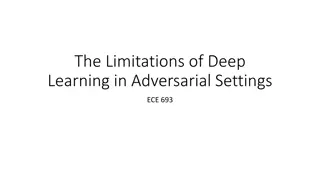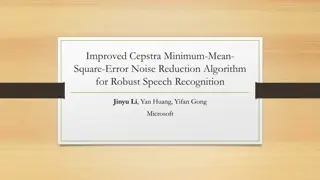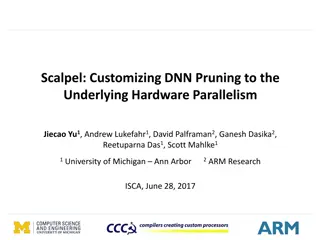Block-grained Scaling of Deep Neural Networks for Mobile Vision
This presentation explores the challenges of optimizing Deep Neural Networks (DNN) for mobile vision systems due to their large size and high energy consumption. The LegoDNN framework introduces a block-grained scaling approach to reduce memory access energy consumption by compressing DNNs. The agen
9 views • 39 slides
Limitations of Deep Learning in Adversarial Settings
Deep learning, particularly deep neural networks (DNNs), has revolutionized machine learning with its high accuracy rates. However, in adversarial settings, adversaries can manipulate DNNs by crafting adversarial samples to force misclassification. Such attacks pose risks in various applications, in
0 views • 38 slides
Improved Cepstra Minimum-Mean-Square-Error Noise Reduction Algorithm for Robust Speech Recognition
This study introduces an improved cepstra minimum-mean-square-error noise reduction algorithm for robust speech recognition. It explores the effectiveness of conventional noise-robust front-ends with Gaussian mixture models (GMMs) and deep neural networks (DNNs). The research demonstrates the benefi
1 views • 43 slides
Enhancing DNN Efficiency with Hardware-Aware Pruning Techniques
Explore the optimization of Deep Neural Networks (DNNs) through weight pruning and parallelism customization to align with underlying hardware capabilities. This study delves into the challenges of DNN complexity, the benefits of compression, and drawbacks of sparse formats, providing insights into
0 views • 27 slides
Deep Similarity Learning for Multimodal Medical Images
Explore how deep neural networks are utilized to learn similarity metrics for uni-modal/multi-modal medical images in the context of image registration and clinical applications. Methods such as fully connected DNNs and stacked denoising autoencoders are discussed, emphasizing the importance of effe
0 views • 19 slides




